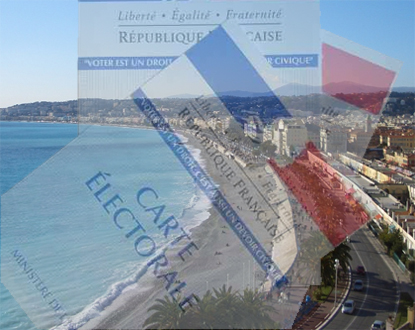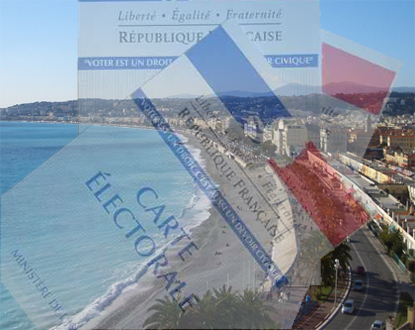Frédéric Ganneval (Artenice), who had already analyzed the polls published in the regional daily, highlighting its methodological shortcomings, comments on last Sunday’s vote.
 At the national level, there was concern during the 2008 municipal elections about a record abstention rate in the first round (33.46%), already making abstention the largest “party” in France, a record now broken! The final figure is around 38.6%, or 5 points higher.
At the national level, there was concern during the 2008 municipal elections about a record abstention rate in the first round (33.46%), already making abstention the largest “party” in France, a record now broken! The final figure is around 38.6%, or 5 points higher.
Abstention in municipal elections is a well-known phenomenon that can be explained sociologically and politically.
Sociologically, participation in a municipal election depends on citizens’ feelings of being integrated into the social organization.
Economic integration: The higher a citizen’s socioeconomic status or income, the more they tend to defend their economic interests through voting. Conversely, the more a citizen feels excluded from the economic world, the more they tend to think that voting won’t change their situation.
Community integration: The more active a citizen is in their community, through an association (sports, religious, cultural, social, …), the more likely they are to defend their association’s interests by voting.
Rootedness in the community: The closer a citizen is to feeling the impact that their mayor and municipal team can have, the more often they encounter them on the street, the more tempted they will be to vote. It follows that voters are more easily mobilized in small towns than in large cities. Additionally, housing pressures pushing citizens to live in smaller “dormitory” towns without feeling fully involved in the life of these places, where they just pass through, explains the voting erosion in these small towns.
Age: Indeed, the “patriotic” feeling correlates with the age group to which the citizen belongs. Among 18-35-year-olds, voting is mainly perceived as a right, among those over 65, it’s a duty. An exception is first-time voters who see voting as a rite of passage into adulthood. After this first vote, the “right” quickly takes precedence over the “duty”.
All of these indicators, the increase in unemployment, precariousness, territorial mobility, as well as the disappearance of the perceived duty to vote, explain why citizens are sociologically less and less mobilized for elections, whether municipal or presidential.
Politically, the lack of stakes or political offers also contributes to reinforcing abstention. In a tense economic context, citizens focus on their primary needs (employment, housing) and security (according to Maslow’s famous pyramid). Therefore, the less an election seems able to provide answers in these areas, the less citizens tend to go to the polls.
Furthermore, the dilution of power (community of communes for municipal elections, European Parliament for presidential elections, …) and the lack of clarity of this power does not encourage citizens to vote. They can no longer identify who can do what.
Finally, the political offer is perceived neither as visionary nor different between traditional left and right, nor ultimately capable of responding to citizens’ primary needs. This negatively impacts voters’ interest in the election and reinforces hostility towards the political class as a whole, amplified by internal party quarrels and scandals that tarnish the political class overall.
Will the law on blank voting change things?
The law passed on February 21, on counting blank votes separately from null votes, which will come into effect in April, will have little impact on abstention.
For this law to be truly incentivizing, blank votes would need to be counted in the votes cast and provide a clearer means for current militant abstainers to express themselves and influence the election. Should we also, as in some countries, oblige voters to go to the polls to fulfill their duty? In Australia, citizens not registered are subject to a fine of 50 Australian dollars (28€), while those registered but not voting are fined 20 dollars (11€). Abstention has dropped from an average of 40% to less than 8%.
Therefore, this first round, both nationally and locally, is not a surprise.
Christian Estrosi
Those who claimed victory for Christian Estrosi in the first round did not learn from the 2008 municipal election during which Christian Estrosi was also deemed the winner from the first round. Announcing such a sweeping victory only discourages voters from going to vote, leaving room for those who support the underdogs in the race.
Patrick Allemand
On March 5, Artenice and the “Polls and Municipalities” research group from the Political Science Department of the University of Nice clearly showed that 40% of voters who supported Patrick Allemand in 2008 had not yet chosen a candidate for 2014. An electorate probably weakened by a clearly identified discourse and also by a rejection of the current government.
Marie-Christine Arnautu
Once again, in the same report published by Artenice last March, it was clearly shown that there was no significant gap between the Socialist Party candidate and the National Front candidate and that, consequently, the National Front’s score could surpass the Socialist Party’s. This is especially true since the National Front electorate (militant or protester) is always highly mobilized.
Bettati
Finally, Olivier Bettati capitalized on voters seeking a candidate outside the UMP and Socialist Party without succumbing to the National Front. This is how he surprises and advances to the second round.
(To be continued tomorrow, the second part of the analysis…)


